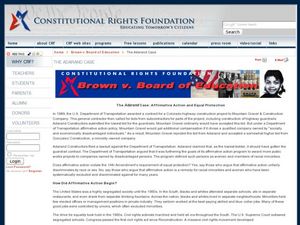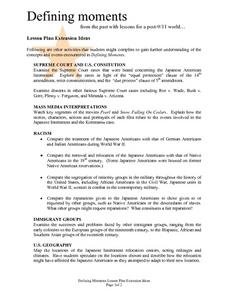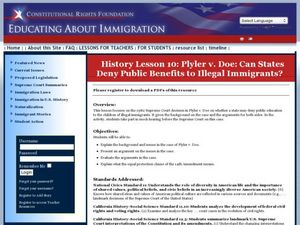School Improvement in Maryland
Supreme Court Case Overview I
As part of a study of the 14th Amendment to the United States Constitution, class members examine four Supreme Court decisions—Gitlow v. New York, Mapp v. Ohio, Gideon v. Wainwright, and Griswold v. Connecticut—that incorporated the due...
C-SPAN
14th Amendment Equal Protection Clause
Two Supreme Court cases, Plessy v. Ferguson and Brown v. Board of Education take center stage in a lesson about the Equal Protection Clause of the 14th Amendment. Class members research both cases to compare and contrast the rulings.
Judicial Learning Center
Civil Rights and Equal Protection
Almost every American is familiar with the Supreme Court case of Brown vs. Board of Education. Far fewer understand the constitutional reasoning or the wide-ranging consequences of the ruling in the field of criminology. The interesting...
Curated OER
Constitutional Amendments and Gay Marriage
High schoolers study the legal battles involving same-sex marriage. They examine primary sources and a video regarding the 14th amendment and its implications for gay marriage. They analyze a report of a California case that was sent to...
State Bar of Texas
Hernandez v. Texas
What if the jury is not made up of people from your ethnicity or background—are they still considered your peers? Scholars analyze the impact the Supreme Court case Hernandez v. Texas had on jury selection across the nation. Paired...
State Bar of Texas
Dred Scott v. Sandford
Who decides someone is not a real person? Scholars investigate the Dred Scott v. Sandford court case which deals directly with slavery and citizenship. After viewing a short video clip, classmates work in pairs to assess and discuss the...
Curated OER
People's Rights Change With the Decisions of the Courts
Ninth graders research the Bill of Rights, and the difference between a conservative and a liberal court decision. They examine how peoples' rights are expanded or limited by court decisions.
Curated OER
Case Studies on the Sixth Amendment
High schoolers trace the historical background of the sixth Amendment to the Constitution. They identify the legal issues and legal arguments in the cases studied, and evaluate the court's decisions.
Curated OER
In the Courts
Students explore desegregation in the courts. In this civil rights lesson, students listen to their instructor present a lecture on Supreme Court cases Brown v. Board of Education and Plessy v. Ferguson. Students examine the cases and...
Constitutional Rights Foundation
Plyler v. Doe: Can States Deny Public Benefits to Illegal Immigrants?
Illegal immigration is an ever-changing source of consistent controversy. A reading passage about the rights of undocumented workers and illegal immigrants—and the lack thereof—guides high schoolers into a mock trial activity. Three...
Curated OER
Government Lesson Plan: Lesson Plan 8
Students analyze the Fourteenth Amendment. They discuss Reconstruction, read the provisions of the Fourteenth Amendment, define the provisions, and in small groups analyze a Supreme Court case that was impacted by the due process clause.
Curated OER
Due Process
Young scholars explore the concept of due process. In this American law lesson plan, students view a 9-slide PowerPoint presentation on the topic and then respond to 3 discussion questions about the 5th and 14th amendments.
Curated OER
A More Perfect Union: Barack Obama's Race Speech at the National Constitution Center
Eleventh graders explore the process of perfecting the Union through changes made to the Constitution, and through the powers delegated to each branch of government. In this American Government lesson, 11th graders research various...
Curated OER
The Adarand Case: Affirmative Action and Equal Protection
Eleventh graders examine the Adarand case. For this American Government lesson, 11th graders create a list of reasons for each affirmative action program. Students develop a defense on certain issues and present it to the class.
Pacific University Oregon
Civil Rights: US History
To gain an understanding of the Civil Rights Movement of the 1960s, class members investigate the Jim Crow Laws, the Emancipation Proclamation, the 13th, 14th, and 15th Amendments of the US Constitution, and the 1898 Supreme Court case,...
Curated OER
Racial Discrimination and the Death Penalty
Available on RTF file. Students study race and its relationship to the death penalty. Students also review court cases and constitutional amendments related to racial discrimination.
PBS
Ken Burns: Jackie Robinson - A Journey Back to Separate but Equal Conditions
Baseball great Jackie Robinson fought for social justice. His efforts to push for equal access are detailed in an episode from from the Ken Burns: The Jackie Robinson Collection. After viewing the clip, class members engage in a series...
Curated OER
Defining moments from the past with lessons for a post-9/11 world...
Young scholars examine extension ideas concerning 9/11, Defining Moments. They analyze a variety of Supreme Court cases, the U.S. Constitution, Mass Media Interpretations, Racism, Immigrant groups and U.S. geography. Many questions are...
Curated OER
The Fight to End "Separate but Equal" in American Schools
Middle schoolers study the court cases related to Brown v. Board of Education and the "separate but equal" standard established by Plessy v. Ferguson. They create an informational display that can be used to teach others the particulars...
Curated OER
The Changing Meaning of "Due Process"
Learners examine the United States Constitution and how the application for due process differs in two amendments. They research the changing definition of the term since the Civil War. They use the internet to research press coverage of...
Curated OER
Separate But Equal Video
Eighth graders watch the video "Separate But Equal." They choose an incident or event from the video that is interesting or meaningful to them and write an objective news article and an editorial.
Curated OER
Due Process of Law and the Jim Crow Era
High schoolers analyze eight case studies of Supreme Court decisions regarding due process of law and their impact on American society in the early 20th century. They digest that although the 14th amendment was intended to give federal...
Curated OER
History Lesson 10: Plyler v. Doe: Can States Deny Public Benefits to Illegal Immigrants?
Learners consider the rights of illegal immigrants. In this illegal immigration lesson, students analyze the Supreme Court case Plyler v. Doe and determine whether illegal immigrants should have access to public benefits. Learners...
Curated OER
Should Homosexuals Have the Right to Laws Protecting Them From Discrimination?
Students explore discrimination issues in America. In this homosexual rights lesson, students listen to their instructor lecture on antidiscrimination laws and gay rights. Students respond to questions about the Romer v. Evans case.

























